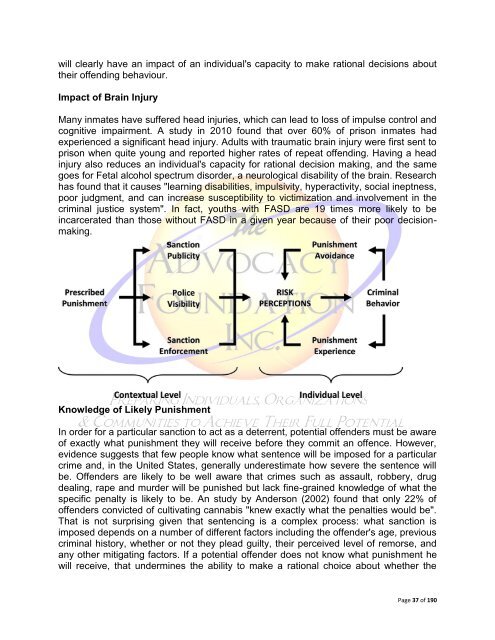The Violent Crime and Law Enforcement Act of 1994
The Violent Crime and Law Enforcement Act of 1994
The Violent Crime and Law Enforcement Act of 1994
You also want an ePaper? Increase the reach of your titles
YUMPU automatically turns print PDFs into web optimized ePapers that Google loves.
will clearly have an impact <strong>of</strong> an individual's capacity to make rational decisions about<br />
their <strong>of</strong>fending behaviour.<br />
Impact <strong>of</strong> Brain Injury<br />
Many inmates have suffered head injuries, which can lead to loss <strong>of</strong> impulse control <strong>and</strong><br />
cognitive impairment. A study in 2010 found that over 60% <strong>of</strong> prison inmates had<br />
experienced a significant head injury. Adults with traumatic brain injury were first sent to<br />
prison when quite young <strong>and</strong> reported higher rates <strong>of</strong> repeat <strong>of</strong>fending. Having a head<br />
injury also reduces an individual's capacity for rational decision making, <strong>and</strong> the same<br />
goes for Fetal alcohol spectrum disorder, a neurological disability <strong>of</strong> the brain. Research<br />
has found that it causes "learning disabilities, impulsivity, hyperactivity, social ineptness,<br />
poor judgment, <strong>and</strong> can increase susceptibility to victimization <strong>and</strong> involvement in the<br />
criminal justice system". In fact, youths with FASD are 19 times more likely to be<br />
incarcerated than those without FASD in a given year because <strong>of</strong> their poor decisionmaking.<br />
Knowledge <strong>of</strong> Likely Punishment<br />
In order for a particular sanction to act as a deterrent, potential <strong>of</strong>fenders must be aware<br />
<strong>of</strong> exactly what punishment they will receive before they commit an <strong>of</strong>fence. However,<br />
evidence suggests that few people know what sentence will be imposed for a particular<br />
crime <strong>and</strong>, in the United States, generally underestimate how severe the sentence will<br />
be. Offenders are likely to be well aware that crimes such as assault, robbery, drug<br />
dealing, rape <strong>and</strong> murder will be punished but lack fine-grained knowledge <strong>of</strong> what the<br />
specific penalty is likely to be. An study by Anderson (2002) found that only 22% <strong>of</strong><br />
<strong>of</strong>fenders convicted <strong>of</strong> cultivating cannabis "knew exactly what the penalties would be".<br />
That is not surprising given that sentencing is a complex process: what sanction is<br />
imposed depends on a number <strong>of</strong> different factors including the <strong>of</strong>fender's age, previous<br />
criminal history, whether or not they plead guilty, their perceived level <strong>of</strong> remorse, <strong>and</strong><br />
any other mitigating factors. If a potential <strong>of</strong>fender does not know what punishment he<br />
will receive, that undermines the ability to make a rational choice about whether the<br />
Page 37 <strong>of</strong> 190
















